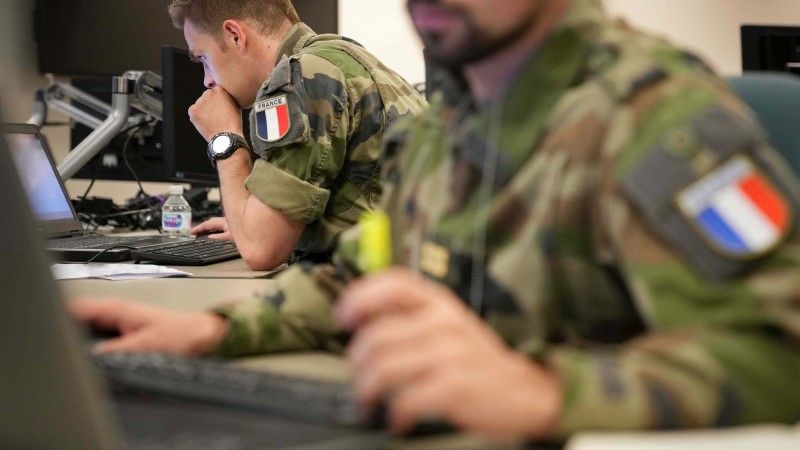Geopolitics
France Readies for Economy Mobilization: Confiscations Possible Thanks to New Law

Photo. Commandement de la cyberdéfense (@ComcyberFR)/X
Faced with growing threats to national security, France has decided to introduce new regulations allowing the temporary confiscation of resources and personnel in crisis situations. The new decree enables the use of key resources and mobilizes individuals to protect the country from threats, including cyberattacks. It also covers supporting allies in conflict situations, including the transfer of weapons. The Minister of Defense emphasizes that the regulations guarantee the rights of mobilized individuals, ensuring appropriate compensation and full reimbursement for their involvement in defense activities.
The new Decree (No. 2024-895 of October 1, 2024, regarding requisitions for national defense and security needs and their connection to various legal regimes concerning crisis preparedness and management) is a key response, fitting into the development of security and defense policy, aimed at effectively managing resources and personnel. The French Minister of Defense, Sébastien Lecornu, pointed out that in the case of a sudden threat to our defense, or a serious danger to the nation or a partner state, France must be able to confront the situation.
As early as 2022, France announced a shift toward a wartime economy. The goal is to prepare the country to respond to conflicts in the most efficient way possible, ensuring that necessary equipment is delivered several times faster than initially planned. At that time, the possibility of taking over factories was not ruled out if the defense industry could not produce fast enough. The administration is also ready to invoke the right to prioritize military orders from companies producing both civilian and military goods, known as „droit de priorisation” (in this case, the right of priority).
En cas d'urgence ponctuelle pour notre défense, de menace d'ampleur sur la nation ou sur un État partenaire, la France doit pouvoir faire face.
— Sébastien Lecornu (@SebLecornu) October 5, 2024
Nous poursuivons notre réarmement, en application de la loi de programmation militaire : mise en place par décret du cadre juridique... pic.twitter.com/KupFRuiINz
The New Decree
- Article 1 introduces changes to the Defense Code, clarifying the rules of mobilization, compensation, and protection of personnel, highlighting the drive for efficient resource mobilization in crisis situations.
- Article 2 extends the requisition rules to individuals and organizations, ensuring their readiness for immediate mobilization, thereby increasing the state's flexibility in the face of threats.
- Article 3 concerns the application of requisitions in overseas territories, such as French Guiana, Martinique, Guadeloupe, and Réunion, to ensure consistency in defense readiness across all areas under French control.
- Article 4 extends requisition frameworks to special overseas territories, allowing local authorities to respond more quickly to threats and manage resources.
- Article 5 pertains to Pacific and Antarctic territories, emphasizing the strategic importance of these regions and France's readiness to defend its interests there.
- Article 6 enforces the provisions of the decree, ensuring its immediate application in overseas territories to guarantee defense readiness.
- Article 7 outlines the responsibilities of various government representatives in implementing the decree, indicating a coordinated, interministerial approach to national defense.
This new legislation aims to enhance France’s mobilization capabilities through coordinated actions, both domestically and in overseas territories, in preparation for security crises. It covers both military and civilian aspects. The changes to France’s Defense Code underscore the state’s flexibility and readiness to respond to threats. Politically and geopolitically, the decree is designed to strengthen Paris« ability to mobilize human, material, and technological resources in the event of a defense or national security crisis.
The introduced changes establish a legal framework for requisitions—of both people and resources—clearly defining the procedures for conscription, compensation, insurance, and conducting defense exercises. These regulations demonstrate that France is preparing to effectively manage crises on local, regional, and international scales, ensuring consistency between central and local levels, including overseas territories.
Confiscation
The government is prepared to requisition (seize) supplies, production lines, facilities, equipment, and even personnel, if necessary, to maintain the country’s wartime economy and support its allies. The minister added that the use of „all possible levers” by the authorities is realistic. France is focused on accelerating arms production.
Once again, the new decree emphasizes that France must continue rearming, in line with the military programming law, by introducing a legal framework enabling temporary requisitions. Importantly, essential elements for the functioning of the economy—such as water, energy, and food—are explicitly mentioned, marking a significant step forward in the confiscation process. Seizures within national capabilities and the entire economy will be crucial for the Armed Forces.
The changes in France reflect an understanding of growing geopolitical threats, including hybrid and unconventional forms of attacks, which require swift state responses. This is especially important given the current international situation, where tensions between major powers, along with threats like terrorism, cyberattacks, and regional instability, demand rapid action and mobilization. The Republic is highly active on the international stage, with its military forces deployed worldwide, actively engaging in conflicts in Ukraine and the Middle East, while also being a target for terrorist attacks. All of this calls for a response.
France views the security of its overseas territories as an integral part of its national defense policy. The changes ensure that territories like French Guiana, Martinique, and New Caledonia, among others, will be as well-prepared for crises as metropolitan France. This highlights the strategic importance of these areas for France, both militarily and politically, as well as the need to maintain their stability and security in the context of growing competition in the Indo-Pacific region and in the Arctic and Antarctic.
The regulations regarding requisitions and crisis-time provisions reflect France’s determination to ensure maximum defense readiness, including increasing the responsibilities and roles of local governments, prefects, and the armed forces in responding to potential threats.
It is clear that a „wartime economy” and „engagement of national resources and personnel” are becoming part of the law. Although there is currently no conflict that France is eager to fully engage in, these demonstrated changes signal (to both allies and adversaries) that the country is prepared to respond in times of crisis.
What about the situation with other allies? (…)
